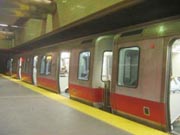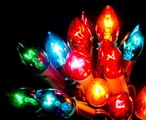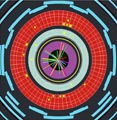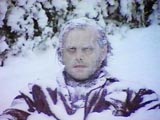


Berkeley Lab researchers are participating in a study sponsored by the U.S Department of Homeland Security in conjunction with the Massachusetts Bay Transportation Authority to determine how airborne contaminants would spread if released into Boston’s subway system. During the study, which started Dec. 5 and continues to Dec. 11, scientists with the Lab’s Environmental Energy Technologies Division will be measuring how gas gets dispersed throughout tunnels and subway cars. More>
 With the flu season upon us, employees are reminded that anyone out sick for five or more consecutive workdays because of a serious illness or injury must check in with the Lab's Health Services. Employees will be asked to provide a release to return to work, including any medical restrictions that may affect the employee's ability to perform the job, signed by their health care provider. Go here for more on the Lab's sick leave policy.
With the flu season upon us, employees are reminded that anyone out sick for five or more consecutive workdays because of a serious illness or injury must check in with the Lab's Health Services. Employees will be asked to provide a release to return to work, including any medical restrictions that may affect the employee's ability to perform the job, signed by their health care provider. Go here for more on the Lab's sick leave policy.
 Lab employees are invited to gather in the cafeteria today to celebrate the holiday season. Doors will open at 3 p.m. and the festivities will continue until 4:30 p.m. Director Alivisatos will address staff at approximately 4 p.m. Attendees are encouraged to bring non-perishable food items and drop them in an Alameda County Community Food Bank barrel located in the cafeteria lobby. Barrels are also located on the 3rd floor of Building 90, the 3rd floor lobby of the Molecular Foundry (Bldg. 67), and the Joint Bioenergy Institute. The drive ends Jan. 4. Online donations are also accepted. As of yesterday, the Lab had contributed more than $315 via the food bank’s website.
Lab employees are invited to gather in the cafeteria today to celebrate the holiday season. Doors will open at 3 p.m. and the festivities will continue until 4:30 p.m. Director Alivisatos will address staff at approximately 4 p.m. Attendees are encouraged to bring non-perishable food items and drop them in an Alameda County Community Food Bank barrel located in the cafeteria lobby. Barrels are also located on the 3rd floor of Building 90, the 3rd floor lobby of the Molecular Foundry (Bldg. 67), and the Joint Bioenergy Institute. The drive ends Jan. 4. Online donations are also accepted. As of yesterday, the Lab had contributed more than $315 via the food bank’s website.
 On the night of Dec. 8, the ATLAS experiment at the Large Hadron Collider (LHC) — in which Berkeley Lab scientists are major participants — recorded the first collisions at the record-breaking center-of-mass energy of 2.36 trillion electron volts (2.36 TeV). This happened when two beams of 1.18 TeV, each circulating two proton bunches, were in the LHC at the same time for a period of several minutes. During this short time ATLAS alone among the four main LHC experiments collected collision events, one of which displayed candidate jets of collision products. For an image of the event go here.
On the night of Dec. 8, the ATLAS experiment at the Large Hadron Collider (LHC) — in which Berkeley Lab scientists are major participants — recorded the first collisions at the record-breaking center-of-mass energy of 2.36 trillion electron volts (2.36 TeV). This happened when two beams of 1.18 TeV, each circulating two proton bunches, were in the LHC at the same time for a period of several minutes. During this short time ATLAS alone among the four main LHC experiments collected collision events, one of which displayed candidate jets of collision products. For an image of the event go here.
 In The News: What's With This Cold Weather? We Ask Scientists
In The News: What's With This Cold Weather? We Ask Scientists [SF Weekly] Ask a weather scientist why it's so cold and you'll get two answers, both of them equally valid. The first is a scientific rationale involving high-pressure systems and advection and whatnot. And the second is that San Franciscans are wussies. Norman Miller, an earth scientist specializing in climate at Berkeley Lab, explains that cool air up north developed into a low-pressure system to the point where it "dropped down along the planetary wave weather travels on. What we're seeing here is called the 'polar jet stream.'" More>
Today at Berkeley Lab encourges comments, suggestions, and story ideas. Please send them here.
TABL is produced by Public Affairs' Communications Group